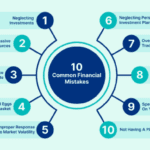The Importance of Estate Planning: How to Secure Your Financial Legacy
Many people believe estate planning is only for the wealthy, but the truth is that everyone needs an estate plan. Without one, your assets may not be distributed according to your wishes, and your loved ones could face unnecessary financial and legal difficulties. Estate planning ensures that your wealth is protected, managed, and transferred efficiently.
Here’s why estate planning is essential and how you can create a plan to secure your financial legacy.
1. What Is Estate Planning?
Estate planning is the process of organizing your assets and creating a plan for how they will be distributed after your death. It involves:
✅ Writing a will or trust
✅ Naming beneficiaries
✅ Appointing a power of attorney
✅ Minimizing estate taxes
✅ Ensuring your family’s financial security
Without an estate plan, your assets may go through probate, a lengthy and costly legal process that determines how your property is distributed.
2. Why Estate Planning Is Important
🔹 Protects Your Loved Ones
A well-structured estate plan ensures that your family is financially secure after you’re gone. It helps avoid disputes over inheritance and ensures that assets are distributed according to your wishes.
🔹 Avoids Probate & Reduces Legal Costs
Probate can take months (or even years) and result in expensive legal fees. A proper estate plan helps avoid or simplify this process, ensuring a smooth transition of assets.
🔹 Minimizes Taxes
Estate taxes and inheritance taxes can take a significant portion of your wealth. Strategic planning can help reduce these taxes, allowing your beneficiaries to inherit more of your assets.
🔹 Ensures Business Continuity
If you own a business, estate planning ensures a smooth transition of ownership. Without a plan, your business could suffer financial and operational difficulties.
🔹 Provides for Minor Children
If you have young children, estate planning allows you to name a legal guardian who will take care of them if something happens to you.
3. Essential Components of an Estate Plan
📜 1. A Will
A will is a legal document that specifies how your assets will be distributed after your death. Without a will, state laws determine how your wealth is divided, which may not align with your wishes.
✅ Appoints an executor to carry out your wishes
✅ Specifies who inherits what
✅ Names a guardian for minor children
🛡 2. A Trust (If Necessary)
A trust is a legal entity that holds and manages your assets. Unlike a will, a trust can help avoid probate and provide more control over asset distribution.
🔹 Revocable Trust – Allows flexibility; you can modify or revoke it during your lifetime.
🔹 Irrevocable Trust – Cannot be changed once established but offers tax benefits and asset protection.
Trusts are useful if you:
✔ Want to avoid probate
✔ Have a large estate and want to reduce taxes
✔ Have minor children and want to control when they receive their inheritance
✍️ 3. Power of Attorney (POA)
A power of attorney authorizes someone to make legal or financial decisions on your behalf if you become incapacitated.
🔹 Financial POA – Manages financial transactions (e.g., paying bills, handling investments).
🔹 Medical POA – Makes healthcare decisions if you are unable to do so.
Without a POA, your family may have to go through a court process to make important decisions for you.
❤️ 4. Healthcare Directive (Living Will)
A living will (or healthcare directive) outlines your medical preferences if you become unable to communicate. It ensures your end-of-life wishes are followed and prevents family conflicts over medical decisions.
👨👩👧 5. Beneficiary Designations
Certain assets, like retirement accounts (401k, IRA) and life insurance policies, pass directly to named beneficiaries.
✅ Regularly review and update beneficiaries to reflect life changes (e.g., marriage, divorce, birth of a child).
4. Common Estate Planning Mistakes to Avoid
❌ Not Having an Estate Plan – Many people avoid estate planning, thinking they have plenty of time. Unexpected events can happen, so it’s crucial to have a plan in place.
❌ Failing to Update Your Plan – Life changes (marriage, divorce, new children, new assets) should prompt an estate plan review.
❌ Not Planning for Taxes – Without proper tax planning, your beneficiaries may face large estate taxes.
❌ Ignoring Digital Assets – Online accounts, cryptocurrencies, and digital files should be included in your estate plan.
❌ Not Communicating With Your Family – Ensure your loved ones know where your documents are and understand your wishes.
5. When Should You Start Estate Planning?
It’s never too early to create an estate plan. If you:
✅ Own property or valuable assets
✅ Have children or dependents
✅ Want to protect your business
✅ Want to ensure your healthcare wishes are followed
Then now is the right time to start planning.
Final Thoughts
Estate planning isn’t just about wealth—it’s about securing your family’s future and ensuring your wishes are honored. By taking proactive steps today, you can protect your financial legacy and provide peace of mind for yourself and your loved ones.




